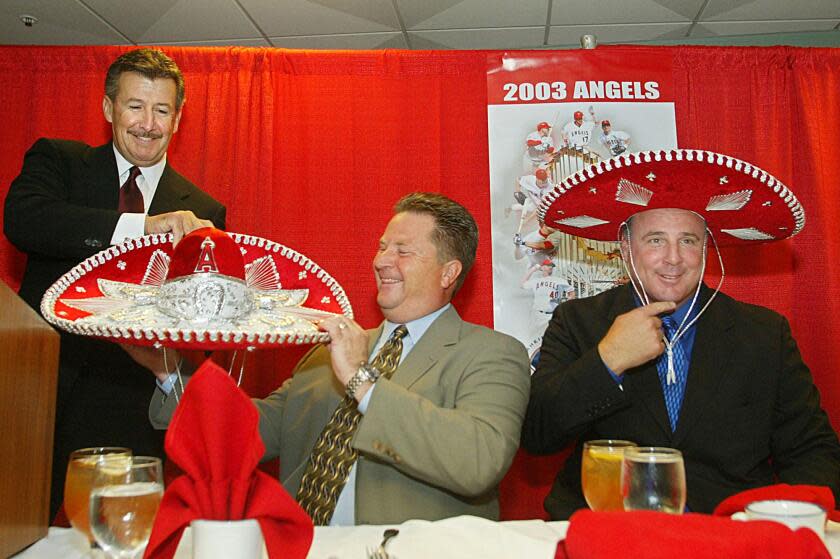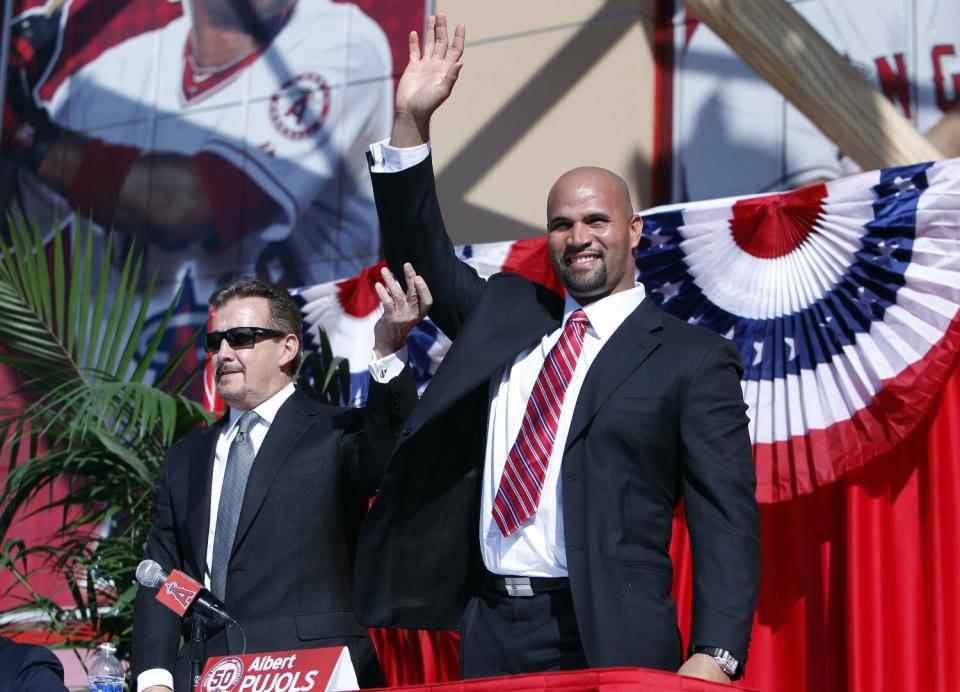Column: Good riddance to Angels owner Arte Moreno and his sombrero of shame

- Oops!Something went wrong.Please try again later.
- Oops!Something went wrong.Please try again later.
- Oops!Something went wrong.Please try again later.
When Arte Moreno bought the Anaheim Angels in 2003, I immediately paid attention.
It was kinda hard not to when the billboard billionaire handed out giant red sombreros emblazoned with the team’s trademark Big A, then donned one himself at his first news conference.
The massive hat was symbolic in multiple ways. It celebrated Moreno’s Mexican American heritage and his status as the first Latino majority owner of a big-time professional sports franchise. It showed that Moreno was approaching his purchase not as a moneyman but a fan. At that same press conference, he announced his first official move — dropping beer prices at Angel Stadium.
His choice of chapeau was also a promise. On the right head, a sombrero is a beautiful thing, the regalia of heroes and heroines in Mexican song and film. Men and women who understand its history bear its weight with pride and reverence.
On the wrong person, it makes the wearer look like a buffoon.
Moreno wore it well at first.
He signed future Hall of Famer Vladimir Guerrero and ace Bartolo Colón in 2004, while lowering ticket prices. He did draw nationwide ridicule for renaming his team the Los Angeles Angels of Anaheim, but fans mostly forgave him because the Halos had become something they had never been before — winners.
As an Anaheim native and lifelong Orange Countian who went to multiple Angels games each year through my teens but never became a bona fide fan, I looked at what Moreno was creating with hope. My generation of cousins grew up almost exclusively Dodgers fans because we never saw ourselves in the Angels. It wasn’t even necessarily a Latino thing. For us, the Dodgers were a model of success from the broadcast booth to the field. The Angels weren’t, and who wants to associate with losers?
But Moreno had a hell of a personal story — a Mexican kid from the Tucson barrio who bought a professional sports franchise, nabbed some of the biggest stars in the game (who just happened to be Latino) and succeeded in the national pastime. He offered something you rarely see in sports owners: inspiration. And if a Mexican could find respect in a famously racist place like Orange County, maybe my homeland might turn for the better.
I started to go to the ballpark again as an adult and began to root for the team. Moreno was a constant presence in the stands, roaming around like former New York Mayor Ed Koch as he asked fans if he was doing a good job. The Dodgers were going through their years in the wilderness under owner Frank McCourt. There was a real chance that the next generation of my cousins might wear Angels red instead of Dodgers blue.
And then, just as quickly as Moreno became one of the best owners in baseball, he became one of the worst.
The bad side of the sombrero caught up with him.
There were hints of this turn from the start, when Moreno told my colleague Bill Shaikin that he felt no responsibility to help Latinos enter his rarefied world.
“I’ve always tried to open doors for anyone — male, female, black, green, brown, whatever,” he said then. “I’m not going to say, ‘I’m in here now and we’ve got to segregate ourselves,’ when what we’ve tried to do in America is open the door for everyone.”
I don’t believe in race-based affirmative action, either. But if you’re not going to give people a step up, then you better bring on the best. Instead, Moreno opened the doors to duds that, like Cinderella’s pumpkin carriage, turned the team back into a laughingstock.
He ignored baseball scouts and saddled the team with massive contracts for high-priced players who, unsurprisingly, underperformed. When the Halos somehow lucked into Mike Trout and Shohei Ohtani — the best player in baseball and the most exciting, respectively — Moreno suddenly turned into a cheapskate and didn’t surround them with a competitive team.
While his team floundered during the pandemic-shortened 2020 season, Moreno appeared with Donald Trump at a Latinos for Trump luncheon in Phoenix and told the crowd it was "very necessary" to vote for Trump.
Even more embarrassingly, Moreno allowed his front office to hold increasingly ridiculous promotional events. Snuggies dress-ups. ’70s Throwback Weekend. Four separate Ohtani memorabilia giveaways this year. On Cinco de Mayo in 2015, over 25,000 fans set a Guinness World Record for the most people to simultaneously wear a … sombrero.
Thankfully, Moreno announced this week that he is exploring the sale of the Halos after nearly 20 years of ownership.
“Throughout this process,” he said via a press release, “we will continue to run the franchise in the best interest of our fans, employees, players, and business partners.”
That would be the first time in years that Moreno put all of our best interests first.
He had an incredible chance to be a transformational owner and instead choked, just like his team notoriously does. His colorblind wishes came true: No one thinks of him as a Latino owner anymore. Latinos never embraced him or the Halos. Everyone just thinks of him as a bad owner, period.
So what happened?
Everyone points to 2012 as the beginning of the end. That’s when he signed St. Louis Cardinal Albert Pujols to a 10-year contract just as the star's career was starting to slide downhill. Instead of learning his lesson, Moreno doubled down and kept signing past-their-prime players like Josh Hamilton, Tim Lincecum and Anthony Rendon. None panned out.

2012 was also when downtown Anaheim burned in the wake of anti-police brutality protests. The mini-riots exposed the Latino-majority city’s inequities to the world and showed that a civic leader was desperately needed to step up and offer hope.
That leader could’ve been Moreno. He never uttered a word. Instead, he began to seek a new stadium under the threat of relocating the Halos, a move that upended Anaheim politics.
In 2013, the City Council approved a deal that would lease the parking lots around Angel Stadium to Moreno for a buck a year while allowing him to keep all revenue from anything he decided to develop — ostensibly to fund construction for a new ballpark. Citizen uproar stopped that deal, but keeping the Angels in Anaheim became an election-year plank that Republican council members hoisted their sails onto — and that Moreno cynically blew hot air into.
In 2019, a new council agreed to sell Angel Stadium and its surrounding parking lots to a Moreno-owned company for a measly $150 million in cash and promises by Moreno to build affordable housing and a park. The deal was so shady that California Atty. Gen. Rob Bonta fined Anaheim $96 million earlier this year for violating the state's public land use law, while an Orange County grand jury report blasted the council for “betray[ing] its constituents.”
As a fitting coda, the FBI earlier this summer announced a massive investigation alleging that a “cabal” secretly ruled Anaheim and used its influence to have the city council rush through the Angel Stadium sale. It’s already led to the resignation of Mayor Harry Sidhu, who an FBI affidavit alleges passed along secret information to the Angels and approached an unnamed team executive for an illegal $1 million campaign donation. The council subsequently voted to nix the Angel Stadium deal. True to form, Moreno's company initially pushed for the sale before he experienced a rare moment of common sense and backed down.
Good riddance, Arte Moreno. You could’ve been a somebody, in a region that sorely needed it. Instead, you leave my beloved Anaheim in political ruins and the Angels a joke. May you take your sombrero of shame on the way outta here.
This story originally appeared in Los Angeles Times.

